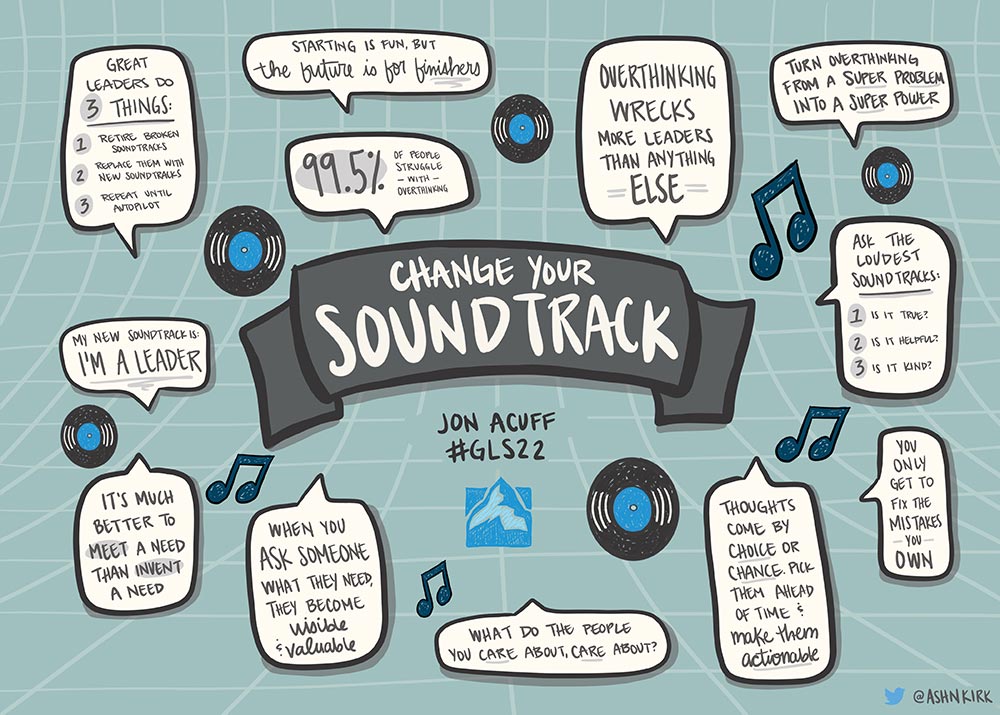
In November 2021, leaders from our longtime partner, Second Church in Danville, IL, partnered with leaders in Abengourou, Ivory Coast to bring The Global Leadership Summit to their community. Be inspired by the impact!

In November 2021, leaders from our longtime partner, Second Church in Danville, IL, partnered with leaders in Abengourou, Ivory Coast to bring The Global Leadership Summit to their community. Be inspired by the impact!

The following illustrative summaries are from The Global Leadership Summit in 2022. Please feel free to use these illustrations to help you reflect on and apply what you learned. All illustrations by Ashley Morgan Kirk.
To access the high-resolution downloadable versions of these GLS22 illustrative talk summaries, along with access to full talks, discussion guides, and bonus content, get GLS22 On-Demand today! Learn More >>

“It” Matters – Craig Groeschel

Making Deeper Connections – Vanessa Van Edwards

The Startup Mindset – Sahar Hashemi

Our Empathy Gap – Johnny C. Taylor, Jr.

Take Back Your Power – Deb Liu

Lead with a Limp – Judah Smith

Growth Mindset – Dr. Heidi Grant

The Power of Story Telling – Ron Howard

Change Your Soundtrack – Jon Acuff

Lead to Serve – Lynsi Snyder

Stewarding Trust – Stephanie Chung

Lead Like Jesus – Andy Stanley
*Bob Iger GLS22 Illustrative Summary only available on GLS22 On-Demand

Jamie says don’t say this one thing and expect people to follow. Instead, it’s about putting others first.

When I was in the fourth grade, I saw the movie, “Jaws” on Edgewood Drive in Hudson, Massachusetts. I remember sitting downstairs in our small Cape Cod style house on the couch, watching the most terrifying movie I’d ever seen.
During one of the scarier moments, I decided that I should probably take my feet off the ground. The thick, brown carpet didn’t look exactly like the water surrounding Amity, Long Island but best not to take any chances. As long as I kept my feet up, sharks couldn’t get me.
That was solid little kid logic at the time. Who hasn’t played, “The ground is lava” on the playground with friends? Lava, ocean, what’s the difference? I pulled my feet up onto the couch, tucked them safely beneath me and proceeded to see how Chief Brody was going to get himself out of this aquatic mess.
I started doing that in the fourth grade and then proceeded to do that for decades. Wait, what? It’s true. One day in my 40s, I caught myself unconsciously raising my legs off a sticky theater floor when the movie I was watching got suspenseful.
“That’s odd,” I thought as I invented a new yoga position there at the AMC 12, “Why am I doing this?”
“Because the ground is the ocean and the only way to save yourself from losing a limb is by raising your feet. Duh.”
“That seems a little bit silly. There’s not even a shark in this movie. This is ‘John Wick 3.’ We’ve got a general sense of what is going to happen and it doesn’t involve a single shark.”
“True, but let me ask you this, in 33 years of strategic foot elevation, has this trick failed once?”
“Well, no, but…”
“Then pipe down and get into position. Keanu Reeves only shot that guy in the head three times. He could still get up and try to stab him with a pencil or something. Get your feet off the ground!”
In movie theaters, at friend’s houses, at my desk right now if I watched a trailer for a horror film, I raise my feet because of sharks. The time or place doesn’t matter. Something inside tells me the ground is dangerous and this is the only way to save myself.
When I first did that in the fourth grade, I wouldn’t have guessed I’d still be doing it in my 40s. Over time it moved from a silly lie, the ground is dangerous water, to something I believed, to an ingrained, automatic action. Simply put, my thoughts were impacting my actions. I was overthinking.
I wish my biggest issue with overthinking was it makes my legs a little sore in scary movies, but that’s not the case. Sometimes, my overthinking is so voluminous that I can barely move forward.
In other situations, my overthinking becomes a self-fulfilling prophecy. I overthink that some project is going to fail so often that I talk myself out of doing any of the work it would take to ensure the project succeeds.
Overthinking causes chaos at home, too. I overthink something my wife didn’t even say so many times that then we finally sit down to talk, I’ve come for an argument, not a conversation.
That’s what overthinking is—when what you think gets in the way of what you want.
That’s what overthinking is—when what you think gets in the way of what you want.
Has that ever happened to you? You needed to make a decision but you couldn’t because you kept overthinking about how much you needed to make a decision? You wanted to request a raise this year at work but kept overthinking how you’d approach your boss until this year turned into next year and next year turned into you never asking?
Overthinking is loud in hindsight, too. You’re still overthinking something you said to a friend 4 months ago, working through countless scenarios of what you should have said instead.
Does any of that sound familiar?
Overthinking runs on soundtracks. A soundtrack is a thought you have so often that it plays automatically. You don’t even have to think about thinking about it, it spins on its own. “The floor is covered with sharks.” “If you ask for a raise you’ll be labeled as greedy.” “You don’t have what it takes to run this department.”
Like a film score you barely notice, everyone has soundtracks running at all times in the background.
Much like a movie, the soundtracks you listen to can change an entire scene. Play something ominous and a quiet summer day suddenly seems “too quiet.” Play something cheerful and unlocking the front door of a darkened house doesn’t seem that frightening.
If the soundtracks you listen to are positive, your thoughts can be your best friend, propelling you on new adventures with creativity and hope.
Broken soundtracks are the most expensive things companies unknowingly invest in every year…
If the soundtracks you listen to are negative, they do just the opposite and hold you back with fear and doubt.
They’re also greedy because they gobble up time, creativity, and energy. Broken soundtracks steal books, businesses, diets, and hope. Broken soundtracks are the most expensive things companies unknowingly invest in every year without understanding the damage they do to culture, productivity, and performance.
Broken soundtracks are one of the most persuasive forms of fear because every time you listen to one it gets easier to believe it the next time. A common broken soundtrack is, “I can rest when I’m done with all my work.” That’s more believable than the ground is the ocean, but it’s equally ridiculous. We’ve never lived in a “done world.” If you believe that you can only rest when you complete all your work, you’ll never stop because you’ll never answer every email, return every phone call, follow up every opportunity and put out every fire.
CEOs never go home and think, “I did every single thing I needed to do today,” any more than teachers go home and think, “I helped every kid that needed help today.”
I work with 50 different corporations around the world each year in my role as a professional public speaker. I once spent the day with a leadership group at a multi-billion-dollar healthcare company. I asked the leaders in the room to answer the question, “How do you rest?” I overheard someone mutter, “I rest when I get sick.”
If you believe that you can only rest when you complete all your work, you’ll never stop…
You know you’ve got a dangerous soundtrack about hustle when you’re looking forward to getting ill. “Once you get beyond the vomiting and hallucination stage, malaria is actually very peaceful. It’s the only time I can catch up on my shows.”
No one would ever say that, but right now there are a lot of stressed-out people nodding along because they’ve been overthinking whether they deserve to take a break.
But what if it didn’t have to be that way? What if overthinking could work for us, not against us? What if we could transform overthinking from a super problem into a superpower?
You know you’ve got a dangerous soundtrack about hustle when you’re looking forward to getting ill
Your thoughts turn into your actions. Your actions turn into your results. Want great results? Start with great thoughts.

The Global Leadership Network’s premier two-day leadership event of the year has been held annually in August for the last 25+ years. Recognized as one of the largest leadership events of its kind, The Global Leadership Summit (GLS) brings leaders and aspiring leaders together from around the world. Through the GLS, many of these leaders gain something far more than leadership insights—they find encouragement to say yes to God’s call on their life. This is what happened for Fiona Cochrane.
In this inspiring Grander Vision story, Fiona talks about her passion to encourage and empower youth in Australia and around the world, and how The Global Leadership Summit inspired her to soar. Through the Global Leadership Network’s GLS Next Gen initiative, thousands of emerging leaders are discovering their purpose.
To help bring The Global Leadership Summit to more youth around the world, donate today at GlobalLeadership.org/Give.

Based on the most recent survey from Edelman Trust Barometer, distrust is at an all-time high. Employees now trust you—their workplace leader—more than they trust government officials or media professionals! This makes the relationship with you incredibly important. With leaders now being thrust into this new role, the question remains, “do you have the capabilities to fulfill it?” Whether or not you are in an official leadership role, you have influence to help address today’s challenges. If you have ever questioned your ability to lead and respond during these unprecedented times, Stephanie Chung’s talk at GLS22 helped leaders explore the three core competencies it takes to navigate this new leadership space with confidence.
Enjoy these official session notes from Stephanie Chung’s talk at The Global Leadership Summit on August 4-5, 2022—Adapting Your Leadership for Today’s Challenges.
How do we level up our leadership so that we’re worthy of the trust that’s being bestowed on us? What is trust?
Because of our bias, what damage could we unknowingly be doing to our company culture, our employees, our families, congregations? What talent didn’t we hire because of our bias, what friendships didn’t we cultivate, what soul didn’t we save?
These various levels can affect our memory, our ability to recall information, our ability to stay focused on something for an extended period of time, and our ability to do multiple things at once.
As leaders, the world is looking to us to bring stability to this emotional chaos we find ourselves in.
Leaders, we’ve been called for such a time as this. I do believe that we will be like the other courageous leaders before us, that during times of uncertainty, when trust was bestowed upon them—they rose up, they understood the call, they minimized their bias, and they made a difference for all.
Dive deeper into this talk and others from GLS22 with GLS22 On-Demand, the only way to get one-year access to faculty talks, interviews, discussion guides, and bonus resources! Explore GLS22 On-Demand >>

Anyone who has succeeded in the business of Hollywood for as long as Ron Howard would have to be called a legend. Transitioning from a child actor to an Academy Awarding-winning filmmaker, all the while creating a thriving personal and family life, is something to emulate. During his interview, our audience heard about his new film, Thirteen Lives, and listened in as Erwin Raphael McManus drew out the secrets behind Ron Howard’s success. In this interview, they explored the process of telling a great story, building trust that produces long and rewarding partnerships, navigating imposter syndrome, and creating a culture where everyone thrives.
Enjoy these official session notes from Ron Howard’s interview at The Global Leadership Summit on August 4-5, 2022—The Leadership Genius Behind a Hollywood Legend.
Dive deeper into this interview and others from GLS22 with GLS22 On-Demand, the only way to get one-year access to faculty talks, interviews, discussion guides, and bonus resources! Explore GLS22 On-Demand >>
“We welcome and encourage comments on this site. There may be some instances where comments will need to be edited or removed, such as:
If you have any questions on the commenting policy, please let us know at heretoserve@globalleadership.org”
Recent Comments